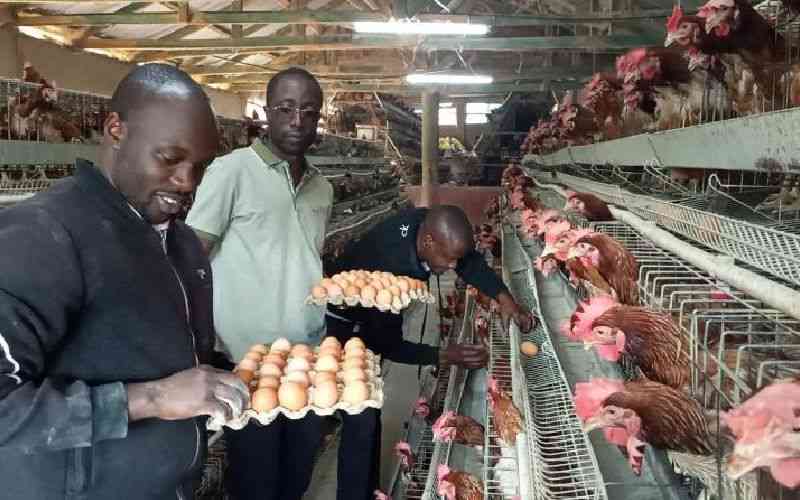
From left: Kitutu Masaba MP Cliff Gisairo(center) collects eggs with his PA James Makini and his financial manager Mark Mosere. [Stanley Ongwae, Standard]
In 2007, three fresh graduates from the University of Nairobi had this big idea of creating a source of income for themselves and jobs for fellow graduates.
The three, current Kitutu Masaba Member of Parliament Clive Gisairo, Mark Mosere and James Makini who are also childhood friends, put their heads together and came up with One Hen Campaign Project. At the moment, Gisairo aged 38, is the lead project manager, while Mosere is the financial controller and Makini is the MP's personal aide.
Interestingly, the seed capital for the project was a hen that was a gift to Gisairo from the grandparents.
"In Gusii, there is a tradition where young boys and girls who visit their maternal grandparents are gifted a chicken to take back home. This was the hen that we started with after buying a cockerel," says Gisairo.
From their little savings, the three set up a poultry farming business at Gisairo's family farm. To manage costs, they used readily-available materials to assemble a makeshift chicken house. From one hen, they now have more than 6,000 improved kienyeji birds. But the journey has not been a walk in the park.
"It was a journey of patience and perseverance. As expected, the first year was tough as we tried to stabilise the business, but slowly things picked up. Despite, the cash flow issues, after a few months, the hen laid eggs (which were fertilised by the village cockerel) laid eggs and hatched chicks which grew to mature birds. Slowly the flock grew," Gisairo says.
Instead of just a commercial business, they changed the business model to a community development project. That is how the project morphed into the One Hen Campaign Project, which basically entailed donating a hen to poor households.

Kitutu Masaba MP Elect Clive Gisairo [Sammy Omingo, Standard]
Youth empowerment
As the chicken numbers grew, the multiplied chickens would be given out to poor families and they would be encouraged to rear them on free-range system.
Under the free range system, the hens would be fertilised by cocks from the neighbourhoods with ease, making multiplication easy.
Any family issued with a seed hen is required to give back two live chicken within six months.
The hens the families gave back would be loaned to other needy homes and the trend continues.
The empowerment model would later evolve to one that is focused on organised youths and women groups in Kitutu Masaba.
The organised groups would be given four chickens in a cage and after six months, they would be required to give back six.
The project blossomed and it was the platform that the youthful MP used to announce his intentions to run for the Kitutu Masaba Constituency seat which he won, making history of being the first candidate to win the seat on a first attempt.
On a light note, during the campaigns prior to the August 2022 General Elections, Gisairo campaigned on the tag of "Engoko (The Hen)". And that is how he got the name "Gisairo bwe Chingoko (Gisairo of the hens).
According to the MP, the poultry project stands out as a model farm where young people interested in learning about modern farming can get practical lessons on feed preparation techniques, disease control and poultry management.
Over the years, the project that now sits on a one-and-a-half acre of land has expanded and embraced the use of modern technology. Because of the numbers, they now rear the birds in cages for easy monitoring and management.
Already, the legislator has installed free WiFi to enable the youths from the constituency to do web-based research on various profitable agricultural activities.
The MP says youths who are interested in poultry farming are given seed chicks to start with as well as technical skills in poultry management.
Though the project is thriving, he admits that it has not been a walk in the park.
The low moments
The MP says the hardest part in managing the poultry business has been feeding the chickens, now that the cost of animal feeds has skyrocketed.
"Feeding the birds has been the biggest challenge and to survive, we have had to find creative ways to manage the high cost of feeds," Mosere says.
To manage the cost of feeds, they now supplement the main meals with vegetables and kitchen leftovers.
Another low moment, was when they lost hundreds of birds due to disease attacks. To avoid such incidences in the future, they have stuck to a strict vaccination plan for the birds against common diseases.
"Having suffered disease attacks in the past, we learned the hard way. Now our strategy is a robust prevention plan that includes vaccination and strict hygiene standards at the poultry units. This way, we are able to keep diseases like New Castle at bay," Makini says.
On disease control and management, Alex Migika, a specialist in animal health says following a strict vaccination schedule is key for a healthy flock.
He also adds that cage rearing that the farm uses is also a system that helps manage the birds.
"Unlike in free range or deep litter system, cage rearing which they use is effective in disease control especially bacterial diseases which spread fast," Migika says.
He adds that vaccinating birds also protects them against common diseases like fowl typhoid, coccidiosis, East Coast Fever and fowl pox.
Besides vaccinations, proper feeding with a balanced diet and observing high hygiene can be a major factor in the prevention of diseases and infections. Challenges aside, the MP admits that the future of poultry business is bright because of high demand for poultry products.
"The demand for eggs is huge. For example, the chickens we have here do not produce enough eggs that can satisfy even the local market. That is why Ugandans have found good markets for their eggs in our country," Gisairo says.
 The Standard Group Plc is a multi-media organization with investments in media
platforms spanning newspaper print
operations, television, radio broadcasting, digital and online services. The
Standard Group is recognized as a
leading multi-media house in Kenya with a key influence in matters of national and
international interest.
The Standard Group Plc is a multi-media organization with investments in media
platforms spanning newspaper print
operations, television, radio broadcasting, digital and online services. The
Standard Group is recognized as a
leading multi-media house in Kenya with a key influence in matters of national and
international interest.
